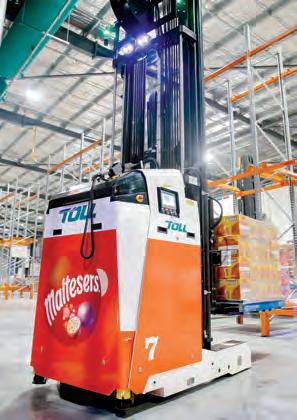
4 minute read
LOGISTICS
AGVs maximise performance, safety, and operational resilience for Mars Wrigley
Dematic has supplied industry solutions for more than 200 years and a recent project with the Toll Group and Mars Wrigley showcased the company’s expertise. Food & Beverage Industry News reports.
Transportation and logistics company, Toll Group, has recently opened the doors to its new, highly automated, and purposebuilt food distribution centre (DC) in Melbourne’s west, for its customer Mars Wrigley Australia.
The DC is now the main Mars Wrigley national supply chain facility. Working alongside intralogistics innovator Dematic, Toll has built a facility to manage all its national storage, dispatch and replenishment operations.
It has been designed to optimise warehouse operations in a resilient and robust way, as well as to accommodate for current and forecast future demand growth.
Peter Stokes, Global Logistics president at Toll, said that the new DC represents the future of supply chain and logistics in Australia, with its advanced integration of automated technology, including Automated Guided Vehicles (AGVs).
“When designing the facility, we took Mars Wrigley’s strategic needs into account and our partnership with them has been particularly important in doing this,” said Stokes.
“The facility is designed and purpose-built for Mars Wrigley to support its national distribution – serving as a multi-chamber, multitemperature facility, now heavily automated with the use of AGVs.
“Mars Wrigley’s definitive direction for this project was to provide a platform for efficiency, safety, and performance for both our customers and the business,” said Chris Georgiou Mars Wrigley’s supply chain director.
The after effects created by the COVID-19 pandemic also played a critical role in Mars Wrigley signing off on the new facility.
“After the unprecedented levels of demand experienced during the pandemic, on top of the already surging demands on the grocery sector in general, it was clear that we needed to make the most out of this new facility, which is why we chose to optimise the use of automation,” said Georgiou.
“This transition has helped us to not only boost efficiency in the current term, but to match our ambitions for future growth.”
Streamlining DC operations
The 17 Dematic AGVs work as driverless forklifts that are integrated with the existing Warehouse Management System (WMS) to be loaded with data before setting off on daily tasks.
“AGVs are an intelligent solution that operate at a faster rate than any palletisation activity done with a manual forklift, with the end result being to eliminate all manual activity completely,” said Tony Raggio, general manager of sales, AGVs, Dematic.
“The entire fleet of AGVs work cohesively with each other, offering a completely automated picking, receiving, and transporting cycle within the DC.”
The AGVs at the Melbourne facility are purpose-built to operate across different areas of the DC.
Thirteen Dematic High-Reach AGVs work to store and retrieve pallets of product in pallet racking, operating up to 10.5 metres high in double-deep racking.
The remaining four Dematic Counterbalance AGVs take care of pallet transportation tasks.
The AGV Manage System (AGVM) communicates directly with Mars Wrigley’s existing WMS, Programmable Logic Controllers (PLCs), manual forklifts, and all AGVs operating within the warehouse.
The AGVs navigate the facility with a laser-guidance system, steer and speed encoders, and on-board hazard detection to avoid collisions, enabling optimal and safe movement around the facility.
By using encoder and laser feedback, the AGVs have a repeatable accuracy of +/- 5mm.
Additionally, the AGVs are powered by Lithium-Ion batteries and can drive themselves onto charging floor plates at times of inactivity to be fully charged in just two hours.
Features of the AGV solution
For Toll and Mars Wrigley, being able to partner on an investment in a new DC that features automation technology optimised to meet high growth now and into the future has been the biggest benefit overall.
The AGV deployment has provided an increased capacity for holding goods in the warehouse, which can store an additional 31,000 pallets – equivalent to 730 million Mars Bars – accommodating for future growth of up to 50,000 total pallets. This will support Mars Wrigley’s growth ambitions in the market.
“Since implementing the AGVs, we have already seen a significant boost in productivity by switching from manual to automated operations. Likewise, the introduction of smart technology and automation will support our ambition to grow as a business,” said Georgiou.
With such a high level of autonomy, AGVs provide the backbone for a 24/7 operation to maximise service levels, which would otherwise be costly to maintain.
AGV systems can naturally grow with the addition of vehicles as volumes increase, and being exchangeable, they provide a good level of system redundancy.
The design of the AGVs also means they can withstand the typically challenging environment of a warehouse, all while providing a 360° safety field of protection. This enables the AGVs to effectively and safely co-work with operators and any other warehouse machinery or vehicles.
“With the safety of DC workers being our top priority, this use of automation with the AGVs creates a safer workplace and minimises mistakes, which can lead to damaged products,” said Stokes.
“This provides a better outcome for Mars Wrigley’s safety standards, while also ensuring its products arrive on supermarket shelves on time and in peak condition.”
Automated Guided Vehicles (AGV) operate faster than any other palletisation process.
What is Dematic?
Dematic has been supplying performance-leading solutions to multiple industries for 200 years. The company specialises in innovation, solutions expertise, compliance, and leadership with its product ranges.
The design, manufacture, installation, and commissioning of an automated logistics system requires a particular level of expertise and know-how and Dematic provides that for its customers. F










